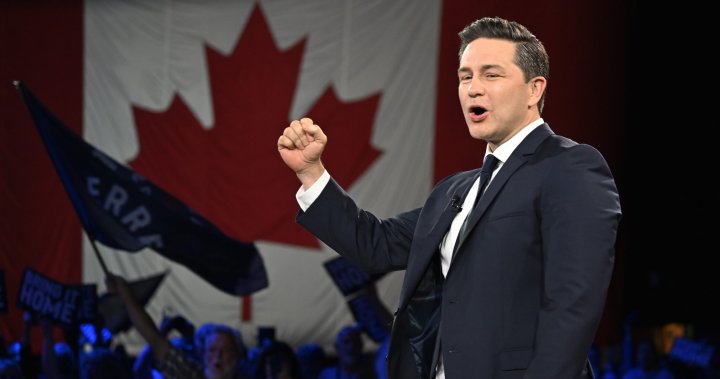The Conservative Grassroots’ Overwhelming Vote to Restrict Gender-Affirming Care for Trans Youth Creates Distraction
The Conservative grassroots demonstrated their strong support on Saturday for a policy that would limit gender-affirming care for trans youth under the age of 18. This decision, however, diverted attention from leader Pierre Poilievre’s primary focus on economic and affordability issues. Poilievre, in his address to party members on Friday night, aimed to keep the conversation centered around the economy and affordability, which are currently the most pressing concerns for Canadians and topics that traditionally give Conservatives an advantage.
Despite Poilievre’s efforts, the majority of Conservative members, 69 percent to be precise, voted in favor of banning “life-altering medicinal or surgical interventions” for trans Canadians under 18 who experience gender dysphoria and related mental health challenges. This new policy aligns with the measures taken by conservative governments in New Brunswick and Saskatchewan to restrict trans youth under 16 from using their preferred names or pronouns at school without parental consent.
Delegate Scott Anderson, speaking on behalf of the policy’s sponsor from British Columbia, argued that “transitional gender surgery is a significant and substantial decision for any adult to make,” and that children lack the capacity to make such decisions.
However, Lisa Bonang, a family physician from Nova Scotia, vehemently opposed the motion, emphasizing that “age alone does not determine the ability to consent” to medical care. She argued that the policy contradicts the party’s values of freedom and bodily autonomy, calling it hypocritical.
Convention Debates Distract from Poilievre’s Focus on Economy and Affordability
Similar to previous conventions that brought up debates about anti-abortion policies, discussions around medical care for transgender youth, “single-sex spaces,” and the right to refuse medical treatments like vaccines have shifted the attention away from Poilievre’s economic and affordability agenda.
Poilievre made it clear that he will not be bound by the policy positions adopted by the party’s grassroots at the convention. While these policies may not directly translate into Poilievre’s election platform, they do provide insights into the priorities of the Conservative base. Issues related to freedom of speech, promoting Canadian energy products, and adopting a more assertive approach to foreign policy and defense matters featured prominently amongst the priorities, with most policy motions receiving strong majority support.
Furthermore, delegates passed a high-level statement on environmental policy, emphasizing the importance of preserving a “clean” climate. However, one Alberta delegate expressed concerns that this motion might expose Canada’s oil and gas industries to attacks from “eco-radicals.”
Poilievre’s Focus on Economic Anxieties and Conservative Party’s Strong Position in Polling
During his speech on Friday evening, Poilievre drew from his interactions during a summer cross-country tour, criticizing Prime Minister Justin Trudeau and pledging to address Canadians’ economic anxieties if the Conservatives form the government. He stated that an economy, where those involved in building homes cannot afford to live in them, is unjust and wrong.
Aside from policy discussions, the Conservative Party enters the fall with ample funds and a strong position in national opinion polls. According to Abacus Data, they hold a 14-point lead over the governing Liberals. In a poll conducted from August 29 to September 4, which surveyed 3,595 eligible Canadian voters, the Conservatives received 40 percent of the national vote, with the Liberals trailing at 26 percent and Jagmeet Singh’s NDP at 19 percent. The poll, accurate within 1.7 percentage points, revealed a six-point lead for the Conservatives in Ontario, potentially indicating trouble for the Liberals’ re-election prospects. However, Trudeau and Singh have control over the timing of the next election, and their governing agreement can last until 2025.
The Conservatives intend to make the most of this time and their fundraising advantage by launching a $3 million advertising campaign to reintroduce Poilievre to Canadian voters. During his speech at the convention, Conservative Fund head Robert Staley confirmed that the advertising effort will continue leading up to the election, alongside Poilievre’s nationwide tour to connect with Canadians face-to-face.
Staley stated, “We know that other parties and unfriendly special interest groups will spend heavily in the (pre-election) period,” indicating that they have allocated a significant amount of money, agreed upon by the leader, to be spent primarily on advertising in the immediate pre-election period.
(This content was retained with HTML tags intact)
Denial of responsibility! Vigour Times is an automatic aggregator of Global media. In each content, the hyperlink to the primary source is specified. All trademarks belong to their rightful owners, and all materials to their authors. For any complaint, please reach us at – [email protected]. We will take necessary action within 24 hours.


